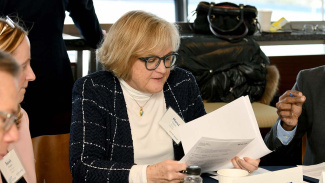What Michigan Ross Alumni Take Away From Students’ 24 Hours of Chaos in the Leadership Crisis Challenge

Since the first competition was held in 2007, around 375 alumni of the Ross School of Business and the University of Michigan have played a crucial role in creating a simulated PR nightmare for students participating in the Leadership Crisis Challenge (LCC).
Acting as demanding board members and judges, and sharing insight from their years of industry experience, dozens of distinguished alumni are central to making the challenge a success each year. The program, developed by the Sanger Leadership Center, asks students to assume executive leadership roles at a fictitious company to navigate a crisis that quickly spirals out of control.
For the first Crisis Challenge of 2020, more than 200 graduate students from across U-M were divided into teams to represent Dryyver, a fake driverless car company that fell into crisis when one of its taxis hit a cyclist. Thirty-three alumni returned to Ann Arbor for the challenge, staffing seven “boardrooms” set up in suites around Michigan Stadium.
“I really enjoy being a part of the LCC because it’s a great way to give back to the university and Michigan Ross,” said Marci Carris, BBA ‘78/MBA ‘83. “The challenge also gives us a chance to work on our feedback and mentoring skills through participating in such a unique action-based learning exercise.”
Carris, senior vice president of Customer Care at Sprint, has participated in seven crisis challenges at both the undergraduate and graduate levels over the last decade. She said the program has noticeably grown and changed a lot.
“The cases are similar but the content is richer and deeper, and the experience of the alumni coming back is richer,” Carris explained. “It used to be faculty and recent alumni who you would see volunteering as board members at the challenges, but now there are more alums who have more professional experience in boardrooms.”
One constant Carris said she has seen from challenge to challenge is that the quality of the students improves each year. That quality is evident in the students’ boardroom presentations where they explain their plans for tackling the crisis, and during the final press conferences where teams face rapid-fire questions from real journalists on how they are handling the crisis, Carris said.
As he returned for his second Crisis Challenge this year, Amit Singhi, MBA '94, also said he enjoys the student interaction and its unique real-life concept. Likewise, Singhi, CFO & COO of the Piston Group, said he believes there is a great value to participate in the program as an alum.
“It’s a way of giving back to your alma mater beyond financial contributions while also sharing your experiences with the students,” he said.
When Singhi was pursuing his master’s degrees at U-M, first in the College of Engineering and then at Ross, he found that hearing from industry professionals was helpful because it gave him perspectives on how to apply concepts in real life. For that reason, Singhi frequently comes back to campus to speak in MBA courses about his career and industry experience.
“I also find it useful to interact with the next generation and see the developments at the school and in the curriculum,” he explained. “What makes the LCC program unique is you’re able to watch students’ thought processes and how they respond to this really challenging situation and I learn something new in that process.”
The opportunity to learn something new was also what drew Michael Brandstaedter, MBA '97, to participate in the challenge for the first time this year.
“I came in blind, but I was really impressed with the students and it made me reflect back to when I was a student, and think about how I would do in that scenario,” said Brandstaedter, president and CEO of the Topps Company. “I think this is an unbelievable experience for students because, from my experience reporting to a board, it’s those issues where there is no right answer that lead to the hardest and deepest boardroom discussions.”
Reflecting on his first challenge, Brandstaedter said the LCC experience exceeded his expectations from the quality of the program to the alumni in the boardroom with him and the caliber of the students. And he would definitely do it again.
“I think we all can be stuck on our hamster wheels doing our jobs, and it’s easy to say you don’t have time,” he said. “But it’s always those experiences when you step off the wheel that you learn something you didn’t expect and gives you new insight in your own roles as well.”
The next Leadership Crisis Challenge will be held for undergraduate students in March, with another 35 alumni set to participate.







